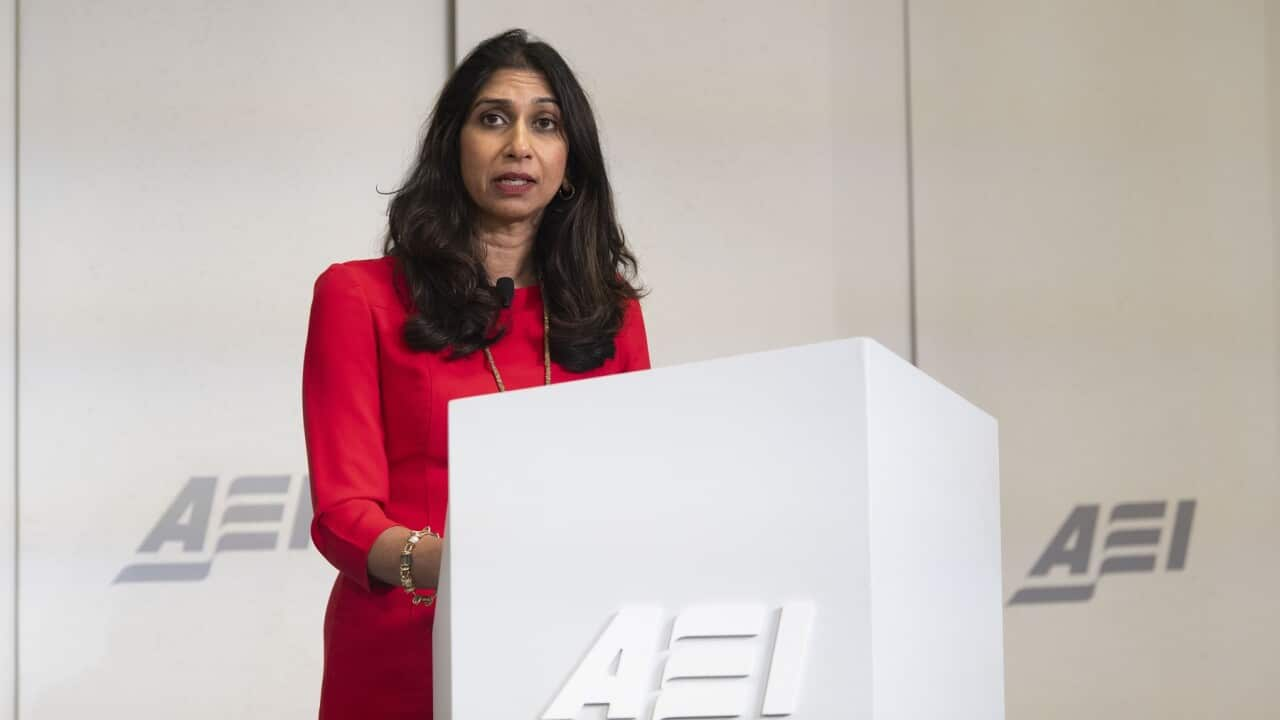TRANSCRIPT
Britain’s Home Secretary Suella Braverman has called on governments to consider rewriting global refugee rules so they are 'fit for the modern age'.
Ms Braverman says people who fear discrimination for being gay or being a woman should not necessarily qualify for asylum.
''Let me be clear. There are vast swathes of the world where it is extremely difficult to be gay or to be a woman. Where individuals are being persecuted, it is right that we offer sanctuary, but we will not be able to sustain an asylum system if, in effect, simply being gay or a woman or fearful of discrimination in your country of origin is sufficient to qualify for protection."
The Home Secretary says people shouldn't be granted asylum unless they are fleeing a real risk of death, torture, oppression or violence.
She's been speaking in Washington D.C, where the U-K Conservative government is seeking international support for its tough stance on asylum seekers.
Britain has adopted an increasingly punitive approach to people who arrive by boat across the English Channel.
But its stance has brought criticism from rights groups and is being challenged in the courts.
The Labour Opposition in the UK has condemned Suella Braverman's comments.
Yvette Cooper the opposition counterpart for the Home Secretary portfolio.
"The Home Secretary has totally failed to tackle the Tories asylum chaos. So, she's ramping up the rhetoric and looking around for someone else to blame."
The United Nations refugee agency has rejected Ms Braverman's calls for the rules to be tightened.
U-N High Commission for Refugees representative Vicky Tennant says the 1951 Refugee Convention remains a life-saving instrument.
"Certainly, it's something we're concerned about and we're always concerned whenever the relevance of the convention is called into question."
The Refugee Convention forms the basis of the Commission's work and provides an agreed definition of a refugee and minimum standards for their treatment.
It was ratified by Britain, and around 150 other countries in 1951- including Australia.
Ms Braverman argues case law arising from the convention has lowered the threshold, so asylum seekers need to only prove they face discrimination instead of a real risk of torture or violence.
She says the number of people who may qualify for asylum has reached unsustainable levels.
"Seeking asylum and seeking better economic prospects are not the same thing. Seeking refuge in the first safe country you reach or shopping around for your preferred destination are not the same thing. Being trafficked, i.e. transported against a will perhaps to be sold into sex slavery and being smuggled. i.e. asking someone to sneak you into a country are not the same thing. The extent to which the global asylum framework enables the obscuring of these categories creates huge incentives for illegal migration."
Government data suggests less than 2 per cent of asylum seekers to the U-K last year included sexual orientation as part of their claim.
Most of those came from Pakistan, Bangladesh and Nigeria, where same-sex relationships are punishable by life imprisonment, or even death.
Similarities between the U-K and Australia's migration policies have been identified.
Britain's Prime Minister Rishi Sunak has previously drawn comparisons to Australia's asylum seeker policies.
"We will detain those who come here illegally and then remove them in weeks, either to their own country if it is safe to do so, or to a Safe Third Country like Rwanda and once you are removed, you will be banned as you are in America and Australia from ever re-entering our country. This is how we will break the business model of the people smugglers and this is how we will take back control of our borders."
But some refugee rights organisations have warned the Australian system should be used as a cautionary tale, not a blueprint.













